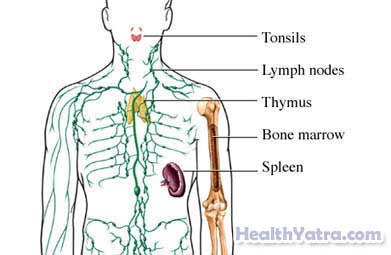Definition
Cytomegalovirus (CMV) is a common infection caused by a virus. It can cause swollen lymph glands, fever, and fatigue. Most people with CMV do not show symptoms of infection and are not aware they have it. A CMV infection usually occurs in young adults. The virus then remains in your body for the rest of your life. It is often in a sleeping state but can be activated by stressful situations.
CMV infections rarely causes health problems except for people with compromised immune systems such as those with:
- Organ transplant
- HIV infection
- Immune suppressing medication
Babies who are not born yet are also at risk for congenital CMV.
Causes
CMV is caused by a herpes virus. The virus is passed between people through body fluids. CMV can be passed during:
- Kissing
- Sexual intercourse
- Breastfeeding
- Changing the diaper of an infected infant
Risk Factors
This virus is so common throughout the US that everyone is considered at risk for CMV. People with the highest risk of getting this virus include:
- Children and childcare providers in day care and preschool—due to frequent exposure to body fluids
- People with suppressed or impaired immune systems including people with:
- Transplant
- Current chemotherapy
- HIV or AIDS
Symptoms
The virus does not cause any symptoms when it is inactive. The virus may be activated because of medication or illness. Symptoms of the activated virus include:
- Swollen lymph glands
- Sore throat
- Fever
- Fatigue
People with suppressed or impaired immune systems can also develop:
- Diarrhea
- Pneumonia
- Colitis—inflammation of the large intestines with ulcers and bleeding
- Retinitis—an eye infection that can cause blindness
- Hepatitis—infection of the liver
- Encephalitis—infection of the brain that can result in seizures or coma
Diagnosis
CMV infection is not often diagnosed because the virus rarely produces symptoms. If CMV is suspected, the doctor may look for signs of the infection in blood or fluid samples. A biopsy may also be done on organs that are affected.
Treatment
Most people infected with CMV will not need a specific treatment. Treatment may be needed if the virus is reactivated and you have a weakened immune system.
Antiviral medications may be used for people who have an organ transplant or suppressed immune system. These medications do not cure CMV but can decrease the symptoms and duration of the illness.
Prevention
While there is no definitive way to prevent CMV, there are a some measures that can decrease your chance of the infection:
- Wash your hands frequently.
- Properly dispose of diapers.
- Do not share glasses or eating utensils.
- Avoiding intimate contact with people known to have the CMV infection.
- Practice safe sex.

